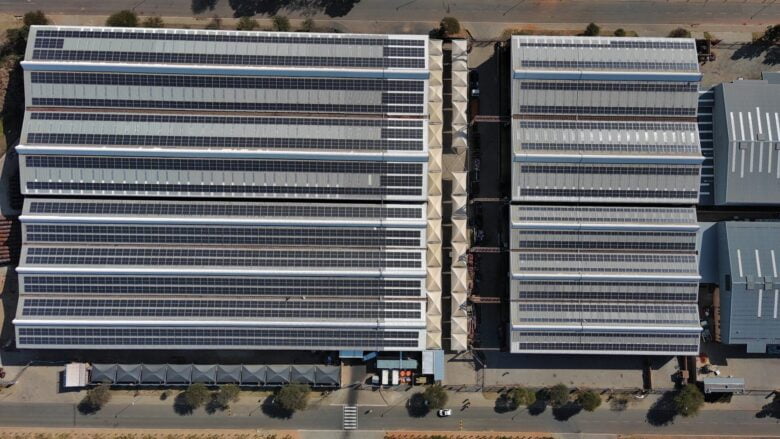Part 4: Off-grid battery grid forming: How to manage microgrids
Introduction:

Battery management in an off-grid power system
Battery management in off-grid power systems is of utmost importance. The main difficulty around battery grid forming is that the state of charge of batteries is always a challenge to measure accurately. The ability to ascertain and accurately measure the charging level of your battery is a basic requirement for the correct operation of the whole system. Not only that, but it is also critical for the maximum battery endurance, otherwise, the batteries will have to be replaced at a comparatively early stage.
In the case of microgrids, it is also imperative that only one energy source can be grid forming. This means that this component sets the voltage and frequency of the whole grid. In this article, our focus would be to explore the scenario where our Battery Energy Storage System (BESS) would be grid forming, and other components would follow the voltage of the grid.
The standalone grid of off-grid system configuration is powered by the renewable energy sources that are available on-site – the most convenient of which is solar energy. The Battery Energy Storage System is an accumulator which stores electrical energy in order to be able to supply it when needed. In the case of off-grid power systems, this is often the only way of supplying electric power in areas that do not have access to a power distribution system or where the cost of grid connection is too expensive compared to a microgrid (Farms, Hotels, Mines, Remote villages or towns).
In such off-grid power systems, battery management is best done through the use of a microgrid controller and an energy monitoring platform. Elum Energy provides a wide range of solar products and ePowerControl MC and ePowerControl PPC along with our monitoring platform ePowerMonitor are best suited to perform these tasks effectively.
Microgrid Controller and Monitoring System
A Microgrid controller such as the ePowerControl MC controls and monitors the charging and discharging of the Battery Energy Storage Systems. It prevents the system from overcharging and also protects against deep discharging. An energy storage controller is essential for maintaining the state of charge within optimal limits. Microgrid controllers specify a predefined maximum voltage and a final discharge voltage. The discharging process ends and the power supply is stopped once the predefined minimum threshold is reached. Elum’s ePowerControl MC manages the energy distribution of the entire system while maintaining maximum operational safety and power reliability.
The controller allows you to orchestrate the charging of your BESS, in order to help reduce your expenses. The operational configuration can either be an auto-consumption mode where the BESS will either be charged with the excess solar PV production or it will supply power to other units to meet the active load requirements. The other configuration is when the BESS is under a certain percentage the Microgrid controller will turn on a Diesel generator to supply the load and partially charge the BESS. The Microgrid controller will fix the power of production of the Genset and the BESS will still be grid forming in this configuration. The Microgrid will then turn off the diesel generator (genset-off) once the BESS reaches a certain level of SOC defined by the client.
For large Microgrid systems, the control solution is done through Elum’s ePowerControl PPC (Power Plant Controller) which in addition to a controller, also provides monitoring capabilities (SCADA). It is a customized solution for large-scale solar power plant applications and can easily integrate with BESS systems and several diesel generators as well.
the Contact us industry ?
Benefits of Off-grid microgrid with battery grid forming installation
The first and foremost benefit of off-grid systems with battery grid forming is the fact that the site can rely on 100% renewable energy thanks to the diesel off mode. This induces a reduction of fuel consumption because the diesel generator is off but also a reduction of noise because the battery is the main grid-forming unit. Diesel generators in this configuration are turned on in the only case where the state of charge of the battery is low and there is no solar production to charge it.
As they do not rely on any other party or service provider for their needs, this microgrid configuration is well-suited for hotels or remote industrial facilities that want to reduce their fuel consumption and increase solar penetration.
Other than that, utility-scale off-grid batteries can provide key services such as frequency regulation, spinning reserve management, and black-start services. It is commonly observed that an imbalance between the power demand and supply for industrial state units or residential neighbourhoods with high energy demand can lead to voltage dips.

In conclusion, off-grid BESS systems in grid forming configuration can work reliably with solar energy systems and maximize solar penetration. With the battery forming the grid all the time, a diesel generator is not required all the time and is only used when the state of charge of the BESS reaches a minimum level. This allows the site to work partially on 100% renewable energy reducing fuel consumption and also the noise of diesel engines.
In order to maximize the performance of your off-grid systems and increase the endurance of your BESS, request a call with one of our microgrid controller experts.
